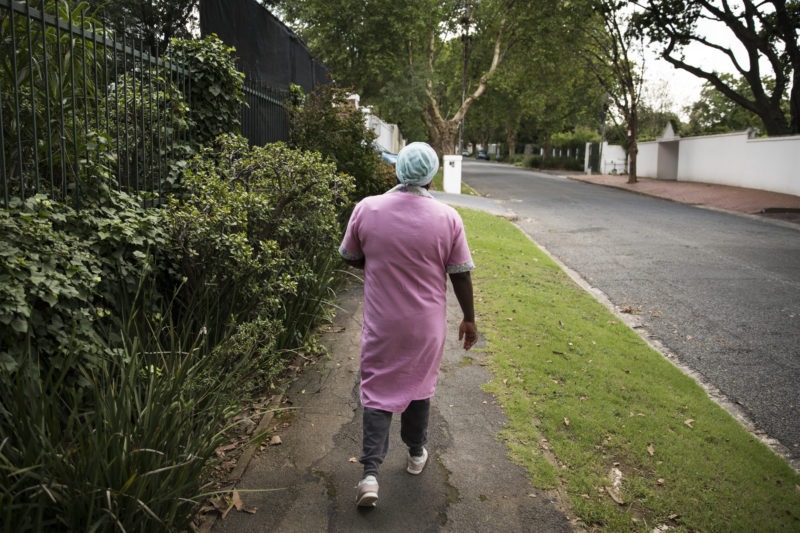S.Africa still hobbled by abusive legacy of domestic work
The apartheid era legacy of domestic staff ‘living in’ makes it easier for employers to ignore labour laws, say advocacy groups in South Africa (Guillem Sartorio)
<p>Johannesburg (AFP) – For three years, SiyamthandaDube lived in a shed outside the house where she cleaned, cooked and babysat for a South African family.</p><p>Her employers asked her to move to "be with the kids" after their mum started a new job in 2014. </p><p>Dube complied, bringing her two daughters and reluctant husband from their home in a Johannesburg township.</p><p>"We put the bed up on top of buckets so that we could put the kids’ mattresses underneath," she said. </p><p>"The house was under trees and all the jojos (bugs) would come inside."</p><p>Domestic workers in South Africa often live on the premises of their employers, in subpar conditions, without job security and on low wages.</p><p>’Living in’ is a legacy of the apartheid era when non-white South Africans were banned from residing in cities.</p><p>To avoid treacherous commutes from faraway townships, black women employed by white households would live at work.</p><p>Today, despite apartheid having ended 25 years ago, most domestic workers’ homes are still a long way from their workplace. </p><p>The distance and a lack of reliable transport keeps the live-in set-up going.</p><p>And, say advocacy groups, that makes it easier for employers to ignore post-apartheid labour laws. </p><p></p><p>- ‘We don’t want her anymore’ -</p><p></p><p>"Employers often feel that if someone is living on their property, they have free rein to use them whenever they need," said Amy Tekie, who co-heads the domestic workers’ network, Izwi.</p><p>It has helped more than 200 women speak up against poor treatment, low pay and unfair dismissals over the past year. </p><p>"People don’t realise that you can’t just fire your domestic worker at will," said Tekie.</p><p>Dube, 31, says she was beaten and then dismissed in 2017 after taking her feverish daughter to the chemist one morning, making her late for work. </p><p>"(My boss) started fighting at me, shouting at me, swearing," she recalled.</p><p>She was knocked unconscious, she said, and taken to hospital. Her employer offered her 200 rand (less than $14) to "keep quiet", she told AFP.</p><p>When she returned, the house keys had been removed from her key chain.</p><p>"I knew I was fired," Dube said.</p><p>"They called my husband and said… we don’t want to see her anymore."</p><p></p><p>- Lack of awareness -</p><p></p><p>Labour rights in South Africa are enshrined in the constitution and domestic workers by law should receive a work contract stipulating their hours.</p><p>It is also one of three African countries to have ratified the International Labour Organization’s (ILO) Domestic Workers Convention, which places a duty on governments to ensure fundamental rights and prevent abuse.</p><p>But enforcement still poses a challenge.</p><p>"You can have a good law on paper," said ILO country office director Joni Musabayana.</p><p>"But how do you ensure that domestic workers and employers are fully up to date?" he said.</p><p>There are still too few labour inspectors despite a recent hike in their numbers and access to private homes and farms depends on the owner’s willingness, he added.</p><p>Tekie said that today most employers were "decent people" who had just grown up in a culture where domestic workers had no rights.</p><p>For Fazlyn Toeffie, it took years to realise that her family’s relationship with live-in staff was "not normal".</p><p>"I grew up in a household… where domestic workers were not respected," said Toeffie, 39, who lives in Johannesburg. </p><p>"The helper had to eat out of the maid’s plate in her servant quarters… and then was called back to wash the dishes."</p><p>Toeffie told AFP that when she decided to hire a housekeeper under "better conditions", she had "no idea" where to start.</p><p></p><p>- ‘Can’t share my stories’ -</p><p></p><p>South Africa has about 1.3 million domestic workers, the ILO says. Government figures are slightly lower, at one million.</p><p>The sector is mostly made up of black women from neighbouring Zimbabwe and Lesotho, according to Musabayana.</p><p>But many work without permits, leaving them even more vulnerable.</p><p>"It is not a group of people who are going to speak up and say ‘no’," said lawyer Chriscy Blouws, who helps women take legal action.</p><p>Itumeleng says she was sexually assaulted by her employer this year.</p><p>A single mother, Itumeleng — whose name has been changed for this story — migrated to South Africa in January and lives with her employers in Johannesburg.</p><p>She works 14-hour days and looks after their baby girl — sleeping with her to spare the parents from waking up at night.</p><p>"One night, my boss came home drunk," Itumeleng told AFP, after gaining rare permission to leave the house.</p><p>"He went in my room and touched me. I thought he was coming to take the baby."</p><p>Teary-eyed, she recalled the scuffle as his wife intervened and pushed her husband away.</p><p>"I can’t share my stories to anyone," said Itumeleng. "I am not a South African and I don’t have a work permit."</p><p></p><p>- Start to see change – </p><p></p><p>"Most domestic workers are not part of any union or any worker organisation," said Tekie.</p><p>South Africa in January implemented a minimum wage but domestic work is one of three sectors excluded from the hourly 20-rand ($1.36) rate.</p><p>The minimum wage for domestic workers is 15 rand ($1) an hour.</p><p>Rights groups have been lobbying for wage parity.</p><p>South Africa’s labour department did not respond to AFP’s requests for comment.</p><p>But Tekie noted that, with the right approach, existing labour laws can still "get outcomes".</p><p>This year domestic workers won the right to claim compensation for injuries at work after a case brought by the daughter of a woman who drowned in her employer’s pool in 2012.</p><p>Dube, too, has taken action — her ex-employer was forced by a labour dispute body to pay her three months’ salary for unfair dismissal.</p><p>She also took him to court, where he was found guilty of physical abuse and sentenced to either six months in jail or a 60,000-rand fine. He opted for the fine.</p><p>"What happened to me is so difficult to forget," said Dube, who still struggles with back pain.</p><p>"I felt like a zombie, but I am better now."</p><p>sch/kjm</p><p></p><p></p><p></p><p></p><p></p><p></p><p></p><p></p><p></p><p></p><p></p><p> </p><p></p><p></p><p> </p><p></p><p> </p><p></p><p> </p><p></p><p></p><p></p><p></p><p></p>
Disclaimer: Validity of the above story is for 7 Days from original date of publishing. Source: AFP.


